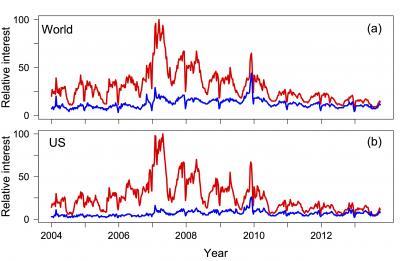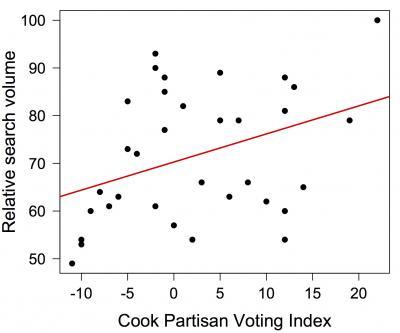After reaching a high-water mark in 2006, when media talking points were portrayed by journalists as settled science prior to the actual IPCC reports in 2007, people have steadily lost interest in climate change since 2007.
There is an upside to that. Scandals like ClimateGate didn't damage public support. The bad thing remains that all of the new evidence for climate change isn't helping either. The public is simply numb in the middle and entrenched on the sides.
In order to do more than move the public a little, climate scientists need to reexamine how to effectively and more regularly engage people. Conspiracy stories about Big Oil and blasting Republicans for being anti-science have no relevance when Greenpeace protests Golden Rice And Democrats get a free pass for being against vaccines, GMOs and cleaner energy.
William Anderegg and Gregory Goldsmith, specifically looked into the effect on public interest and opinion of two widely reported, almost simultaneous events. The first was the November 2009 release of emails from the Climate Research Unit at the University of East Anglia in the United Kingdom. Investigations found that no scientific misconduct took place but the charges they activists inside science were interesting in manipulating journals and blocking out research they didn't like fed the belief by critics that climate change was in large part a political movement rather than a science issue.
Later in 2009, it was revealed that numerous flawed papers - some written by activists, some "grey literature" that hadn't been published - had been used in the 2007 Fourth Assessment Report of the Intergovernmental Panel on Climate Change (IPCC). Claims that Africa would suffer massive farming drops by 2020 and the Himalayas would be melted by 2035 were shown to have no factual basis at all, the latter was just a claim in an interview.
To first get a general sense of public interest in climate change, Anderegg and Goldsmith combed the freely available database Google Trends for "global warming," "climate change" and all related terms that people around the world searched for between 2004 and 2013. The researchers documented search trends in English, Chinese and Spanish, which are the top three languages on the Internet.
Internet searches related to climate change began to climb following the 2006 release of the documentary "An Inconvenient Truth" starring former vice president Al Gore, and continued its ascent with the release of the IPCC's fourth report, the researchers found.

Princeton University and University of Oxford researchers found that negative media reports seem to have only a passing effect on public opinion, but that positive stories don't appear to possess much staying power, either. Measured by how often people worldwide scour the Internet for information related to climate change, overall public interest in the topic has steadily waned since 2007. To gauge public interest, the researchers used Google Trends to document the Internet search-engine activity for "global warming" (blue line) and "climate change" (red line) from 2004 to 2013. They examined activity both globally (top) and in the United States (bottom). The numbers on the left indicate how often people looked up each term based on its percentage of the maximum search volume at any given point in time. Image courtesy of William Anderegg
Anderegg and Goldsmith specifically viewed searches for "climategate" between Nov. 1 and Dec. 31, 2009. They found that the search trend had a six-day "half-life," meaning that search frequency dropped by 50 percent every six days. After 22 days, the number of searches for climategate was a mere 10 percent of its peak. Information about climategate was most sought in the United States, Canada and Australia, while the cities with the most searchers were Toronto, London and Washington, D.C.
The researchers tracked the popularity of the term "global warming hoax" to gauge the overall negative effect of climategate and the IPCC error on how the public perceives climate change. They found that searches for the term were actually higher the year before the events than during the year afterward.
"The search volume quickly returns to the same level as before the incident," Goldsmith said. "This suggests no long-term change in the level of climate-change skepticism.
We found that intense media coverage of an event such as 'climategate' was followed by bursts of public interest, but these bursts were short-lived."
All of this is to say that moments of great consternation for climate scientists seem to barely register in the public consciousness, Anderegg said. The study notes that independent polling data also indicate that these events had very little effect on American public opinion. "There's a lot of handwringing among scientists, and a belief that these events permanently damaged public trust. What these results suggest is that that's just not true," Anderegg said.
While that's good in a sense, Anderegg said, his and Goldsmith's results also suggest that climate change as a whole does not top the list of gripping public topics. For instance, he said, climategate had the same Internet half-life as the public fallout from pro-golfer Tiger Woods' extramarital affair, which happened around the same (but received far more searches).
A public with little interest in climate change is unlikely to push for policies that actually address the problem, Anderegg said. He and Goldsmith suggest communicating in terms familiar to the public rather than to scientists. For example, their findings suggest that most people still identify with the term "global warming" instead of "climate change," though the shift toward embracing the more scientific term is clear.

The researchers found that searchers for the phrase "global warming hoax" and related terms correlate in the United States with Republican or conservative political leanings. They compared the prevalence of searches for "global warming hoax" with the Cook Partisan Voting Index -- which gauges how far toward Republicans or Democrats a congressional district leans -- for 34 US states (above). They found that the more Republican/conservative the state (bottom measurement), the more frequently people in that state looked up related terms. The bottom graph shows how often a state votes Democrat (low numbers) versus Republican (high numbers). The numbers on the left indicate how often people looked up "global warming hoax" based on its percentage of the maximum search volume at any given point in time. Image courtesy of William Anderegg
"If public interest in climate change is falling, it may be more difficult to muster public concern to address climate change," Anderegg said. "This long-term trend of declining interest is worrying and something I hope we can address soon."
One outcome of the research might be to shift scientists' focus away from battling short-lived, so-called scandals, said Michael Oppenheimer, Princeton's Albert G. Milbank Professor of Geosciences and International Affairs. The study should remind climate scientists that every little misstep or controversy does not make or break the public's confidence in their work, he said. Oppenheimer, who was not involved in the study, is a long-time participant in the IPCC and an author of the Fifth Assessment Report being released this year in sections.
"This is an important study because it puts scientists' concerns about climate skepticism in perspective," Oppenheimer said. "While scientists should maintain the aspirational goal of their work being error-free, they should be less distracted by concerns that a few missteps will seriously influence attitudes in the general public, which by-and-large has never heard of these episodes."
Published in Environmental Research Letters.
Source : http://www.science20.com/news_articles/green_fatigue_public_isnt_affected_by_climate_change_scandals_or_new_science-136783